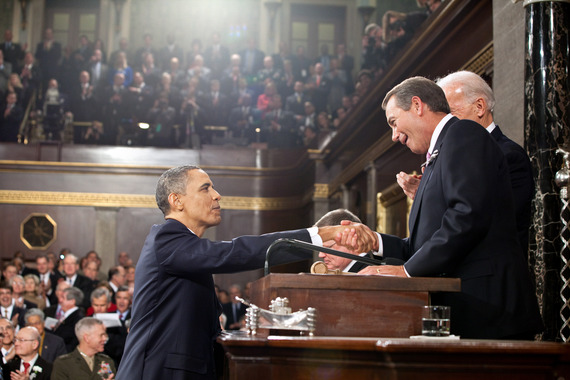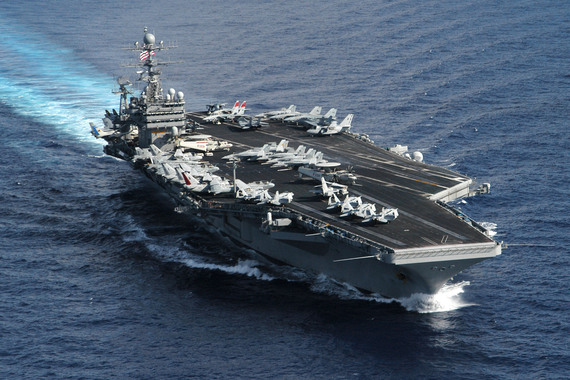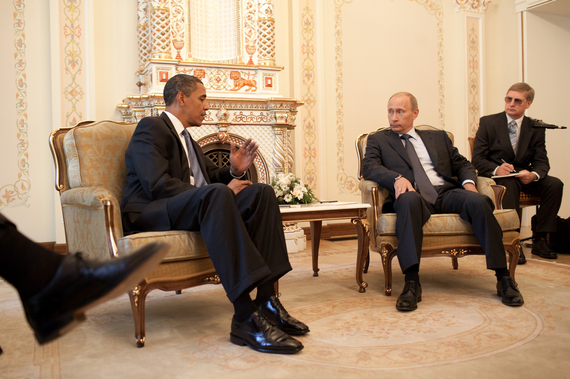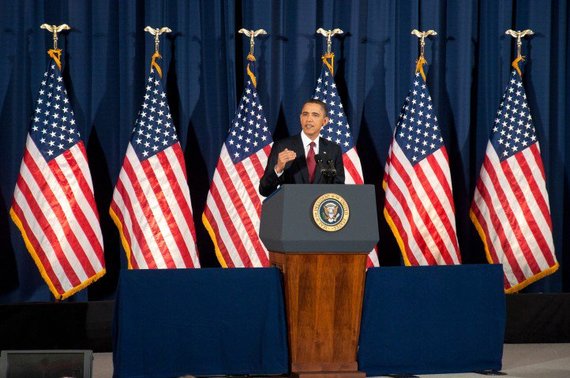 President Barack Obama delivering speech on terrorism at the National Defense University, February 10, 2013
President Barack Obama delivering speech on terrorism at the National Defense University, February 10, 2013
The conduct of foreign policy contains both elements of substance and symbolism. The substance of foreign policy is easy enough to define. It is the enduring principles of American foreign policy and their translation into how the United States conducts its relations with over 200 independent countries and multilateral organizations around the world. It is the treaties, both bilateral and multilateral, that define the rights, prerogatives, and obligations of the United States with the corresponding parties. It is the unofficial agreements and guarantees that, over time, the U.S. government has accepted and which successive administrations have tacitly upheld. All of which is in turn supported by the sinews of power: military might, economic strength, deep pockets of money, and technological prowess.
Symbolism on the other hand is less easily defined. It is not "soft power," i.e., the power of ideas, of shared principals or cultural attractiveness, although such elements often manifest themselves as enduring symbols, universally recognized and understood. The Statue of Liberty is one such "symbol," shorthand for the ideal of the "American dream" and the promise of economic opportunity and advancement that the U.S. has offered to millions of immigrants from around the world.
If the substance of foreign policy is what we say and subsequently do then the symbolism of foreign policy is how we say it. Which foreign leader gets invited to the White House first by a new administration, whom do we send abroad to represent the United State at a multilateral conference, an inauguration, or a funeral? Which countries do a president or his ranking cabinet members visit, what message do they leave behind and where, how and with whom do they deliver it?
When a president dispatches a carrier task force to a troubled corner of the world he is not just demonstrating the global reach of American military power, he is also invoking an important symbol of American military strength and sending a powerful message that what happens in this corner of the world matters to the United States, it is a symbol that we intend to honor whatever commitments we have made. Such are the elements of symbolism in the conduct of foreign policy. Presidents understand the meaning of symbolism. After all you do not get elected to the highest political office of the land without understanding how to create and manipulate powerful images and symbols.
There is a fundamental disconnect between the substance and the symbolism of President Obama's foreign policy. This is not a case of saying one thing and doing another. Such practices are hardly new to government--they have a long and recognizable history independent of who is in power. No, in the case of the Obama administration it is more a case of saying one thing but delivering it in a style and with imagery that belies its authenticity. It is a case of affirming, or at least not reversing, enduring principles of American foreign policy while simultaneously invoking symbols that suggest the opposite.
Consider the fact that there isn't a single key principal of American foreign policy that the Obama Administration has publicly disavowed, not a single security guarantee, either official or unofficial, that the Obama administration has said it would not honor. Yet in myriads of ways the Obama administration has insisted on sending out signals, created symbols that would raise doubts about the very policies that the administration, at least on paper, continues to support.
This is not a question of America's willingness to deploy military force. It's true that the Obama administration moved quickly to reduce U.S. military forces deployed in Iraq and Afghanistan. Indeed, President Obama saw his election as a mandate to wind down the American role in those conflicts. Doing so, however, while it may have proven to be ill advised, did not, fundamentally, run counter to key objectives of American foreign policy.
The United States is not an inherently militaristic nation. We do not go to war in some misguided pursuit of glory or as a measure of our national will or prowess. We go to war because a president has decided that the application of military force will best serve securing the American interest. Admittedly, of late, we have done so much too often and without exercising sufficient foresight to truly weigh or understand the consequences of those decisions. For America, however, war making is a tactic not an underlying principal of our foreign policy.
Consider on the other hand the Obama administration's foreign policies in the Middle East. Officially we have not reneged on any of our commitments to our allies in the region, yet the Obama administration has consistently and symbolically conveyed the message that it wants to disengage from the region, that the turmoil in the region "does not pose an existential threat to the United States," and that the region should find its own "balance of power" and sort out its affairs without reliance on American power, in all its various manifestations, and especially on our willingness to commit ground forces in the region.
All the while leaving unanswered the question, if we disengage what does that mean for the security guarantees that we have made? Will we promptly come back if one of our allies is threatened or is our disengagement an implicit abrogation of those promises of security? The fact that when the Obama administration has engaged military power it has done so reluctantly, hesitatingly, and often times under rules of engagement that make it more difficult to accomplish the very objectives that military force was designed to achieve, further underscores the question of Washington's intentions and the reliability of its commitments.
The examples are legion: the very public spat with Netanyahu, the cold shoulder to Egypt, our inconsistent support toward Kurdish military forces in both Iraq and Syria, the half-hearted air campaign against Islamic State, and most of all our insistence on negotiating an agreement with Iran that many of our Gulf allies felt was inadequate and only served to embolden Iranian aggression in the region. These are all telling examples.
Consider the most recent case. On the week of October 20th, as both the United States and Europe began the process of dismantling the economic sanctions that had been placed on Iran, there wasn't a single American carrier in the Arabian Gulf. When questioned about that point, a Pentagon spokesman responded that the previous carrier, the Theodore Roosevelt, was scheduled for routine maintenance and was in fact already two months overdue and had been withdrawn from the Gulf the week before. The carrier Harry S. Truman, which is scheduled to arrive in a few months, will replace it. This was the first time since 2007, that the United States does not have a carrier task force on station in the region. The Pentagon spokesman went on to add that the U.S. had plenty of other air assets in the region should the need arise.
In fact, the U.S. does have plenty of air assets in the Gulf. In addition, the French have a smaller carrier in the vicinity and there is considerable air power among our Gulf allies as well. Moreover, it is difficult to imagine that at the very moment when the EU and the U.S. were preparing to dismantle their sanctions against Iran, Tehran would want to stage a provocative incident in the Gulf. From a purely military standpoint, the absence of a carrier in the region might impose some constraints on Washington's options, but it should not dramatically affect America's military posture in the Middle East.
In the Arabian Gulf, however, the absence of an American carrier task force was seen as ripe with symbolism. Was it a tacit nod to Tehran, a visual reminder that the U.S. would not stand in Iran's way as it sought to expand its influence in the region; another undisclosed side agreement among the many unofficial, and still largely secret provisions of the nuclear agreement? Was it telling that at a time when Russia was flexing its muscles in the Middle East, indeed at virtually the very moment that Russian ships were entering the Gulf, the U.S. was withdrawing?
It is true that the Theodore Roosevelt was overdue for maintenance work. This is not in dispute. The fact is, a legacy of extended deployments combined with budget cuts has left the U.S. Navy straining to meet all of the tasks required by its carrier fleet. The unanswered question is, whether the subsequent absence of another carrier was a deliberate signal, a symbol of American intentions in the region, or was it simply an oversight? Is it possible that no one in the White House or the Pentagon noticed that by the end of October the U.S. would no longer have a carrier on station in the Gulf and that it would be several months until a new carrier arrived or was Washington simply oblivious to the symbolism it was conveying?
Subtlety, ambiguity, and subterfuge are all elements in the tool chest of statecraft. No nation can conduct its foreign policy with complete transparency. Certainly no great power with its myriad of interests can conduct its foreign policy in such a manner, especially when so many of its opponents hold their cards close to the vest. The issue with the conduct of Obama's foreign policy is not that it's somehow overly ambiguous or vague in its intentions. Nor is it a question of competence. There are plenty of experienced foreign policy professionals in the White House that understand very well both the substance of American foreign policy and how to conduct its diplomacy.
The issue rather is that there is a basic disconnect between the stated objectives of U.S. foreign policy and the symbolism with which the White House often surrounds it. That disconnectedness creates a sense of incoherence in American foreign policy that is marked by an indecisiveness, an inconsistency between the substance of U.S. policy and the symbolism which accompanies it, a hesitation that underscores the unwillingness of the Obama administration to lead and to behave as a great power would be expected to comport itself. In other words, the sense of incoherence that pervades Obama's foreign policy does not stem so much from its stated objectives as it does from the style in which it is carried out and, make no mistake, the "style" of this nation's foreign policy begins and ends in the Oval Office.
President Obama has often been described as a "weak" leader by his critics. That isn't true. To begin with the trials of the presidential selection marathon are sufficiently grueling that weak leaders would be washed out long before they would have an opportunity to be elected to the White House. Moreover, the president has certainly not shown any weakness in the single-minded manner in which he has pursued his domestic agenda. The White House has shown little compunction about riding roughshod over its domestic opponents or stretching the very limits of executive authority in order to impose its will.
Why is it that an administration that has shown itself to be such a tenacious, take no prisoners, competitor in domestic politics seem so ambivalent and hesitant in the conduct of its foreign policy? Why is Barack Obama so willing to defy John Boehner but hesitant to stand up to Vladimir Putin? House Republicans take note--maybe you should consider Putin for the Speakership, or at the very least Majority Whip!
No, the problem is not the President's strength of character or willpower. Obama has plenty of both. The issue rather is in the Obama White House's view of the world and Obama's fundamental uncomfortableness with the role that the United States plays in it. For Obama the conduct of the United States on the world stage and the exercise of American power is part of a continuous line of Euro-American, political, economic, cultural, and military dominance over the rest of humanity that has endured for the better part of half a millennium.
In this worldview, the behavior of the U.S. on the world stage in the 21st century is nothing more than the continuation of the historical legacy, the intellectual and moral descendent of 500 years of rapacious European imperialism and its subjugation and ruthless exploitation of the non-Caucasian people of the world. In that narrative, the United States may have been late to that party, but it has been a willing and enthusiastic participant since it joined the Euro-American imperialist club. That is why the Obama administration is fundamentally more comfortable in multilateral forums where it can just be "one of the boys" and that is why the Obama administration seems so hesitant in its exercise of American power, military or otherwise, around the globe.
The Obama White House would like to live in a world where the lion lies down with the lamb--a happy occurrence that unfortunately has not happened since Adam and Eve were abruptly ejected from the Garden of Eden. In our world, sadly, lions don't lay down with lambs they eat them. The issue for this Administration is that the United States has long-standing commitments to protect the lambs of the world--which requires us to chase the lion off if it gets to close and in the worst case, if need be, shoot the lion. The problem for our allies, and for the conduct of U.S. foreign policy in general, is that the White House keeps signaling a hesitancy to drive the lion away much less shoot it. If you were the lamb wouldn't you be worried?
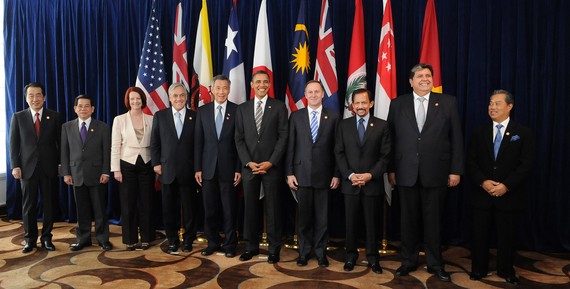 Barack Obama with leaders from Pacific Rim countries at the negotiations for the Trans-Pacific Partnership , 2010
Barack Obama with leaders from Pacific Rim countries at the negotiations for the Trans-Pacific Partnership , 2010
The fundamental issue with the foreign policy of President Obama is that it is pervaded by a strong sense that the White House is fundamentally uncomfortable with being the leader of a superpower. The problem is that we are a superpower, and that the rest of the world, at least those countries that are not fundamentally opposed to us, look to Washington for leadership.
When America declines or is hesitant about exercising that leadership the outcome is not a more democratic world but a more chaotic and unstable one. A world in which invariably the vacuum of leadership is taken up not by other like-minded countries but by "bad actors" whose actions are inimical to both American interests and those of our allies. This is the pattern that has emerged in places like the Middle East or the South China Sea.
American disengagement from the world in general, and the Middle East in particular, will not produce a more stable or a more peaceful Middle East but one that is more dysfunctional and dangerous, one more prone to violence, one in which Russia and Iran will have a free hand to impose their will on their neighbors.
Either you lead or you don't. But you cannot lead by half measures--you cannot lead part of the time and be absent otherwise. Contrary to the White House's assertion, you cannot "lead from behind." The glaring contradiction of Obama's foreign policy, the wellspring of its seeming incoherence, is that the leader of the free world seems fundamentally uncomfortable with leading it and in exercising the prerogatives of a superpower, which as its leader, he must sometimes do. The Obama administration needs to either change the world or change its style--sadly it has not been able to do either.

